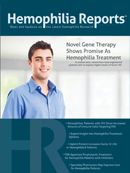FDA Approves Prophylactic Treatment for Hemophilia Patients with Inhibitors
Study results show FEIBA (anti-inhibitor coagulant complex) produced a 72 percent reduction in median annual bleed rate compared to treatment with an on-demand regimen.

The US Food and Drug Administration (FDA) recently approved FEIBA (anti-inhibitor coagulant complex), the first-ever treatment for routine prophylaxis to prevent bleeding frequency in patients with hemophilia A or B who have developed inhibitors. Up to onethird of previously untreated patients with severe to moderately severe hemophilia A are at risk for developing inhibitors, which can complicate treatment and increase the patient’s risk for complications, including joint damage.
The anti-inhibitor coagulant complex was previously approved for the control of spontaneous bleeding episodes and surgical interventions in patients with hemophilia A and B.
“This FDA approval of a prophylactic regimen should change the way physicians think about managing hemophilia with inhibitors, validating FEIBA prophylaxis as an effective new option to treat their patients,” Steven Pipe, MD, director of the Division of Pediatric Hematology and Oncology at the C.S. Mott Children’s Hospital at the University of Michigan, Ann Arbor, said in a news release from Baxter International, Inc.
Approval was granted based on data from FEIBA PROOF, a 12-month phase III clinical trial that enrolled 36 patients with hemophilia A or B who had developed inhibitors. According to the Baxter news release, prophylactic treatment with FEIBA produced a 72 percent reduction in median annual bleed rate compared to treatment with an on-demand regimen. In the intent-to-treat (ITT) analysis, “three of the 17 (18%) adult patients in the prophylactic arm reported no bleeding episodes.”
During the clinical trial, the most frequently reported adverse reactions were anemia, diarrhea, hemarthrosis, hepatitis B surface antibody positive, nausea, and vomiting. Other serious adverse reactions seen with FEIBA are hypersensitivity reactions and thromboembolic events, including stroke, pulmonary embolism and deep vein thrombosis.
According to Pipe, these results “demonstrated that a prophylactic regimen with FEIBA can significantly reduce the rate of bleeding episodes, as compared to an on-demand regimen, in hemophilia patients with inhibitors. This is important among these patients who often have difficult-to-treat bleeds and are at risk of additional complications.”
Results from a previous six-month study published in 2011 demonstrated a 62 percent reduction in all bleeding episodes with FEIBA prophylaxis compared to an on-demand regimen.
